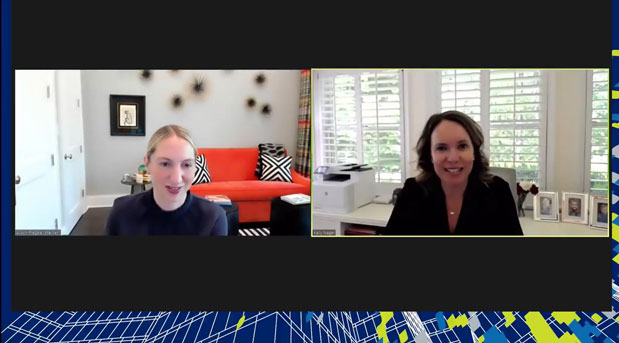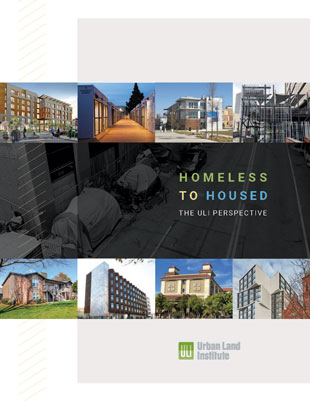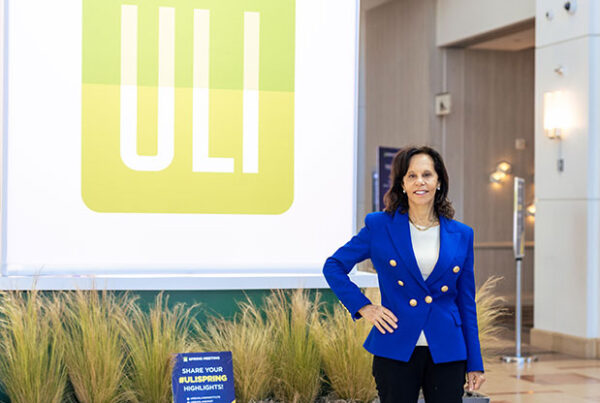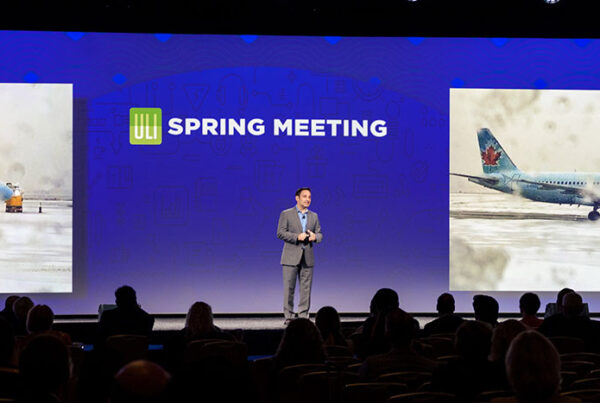Meeting attendees taking part in a Women’s Leadership Initiative (WLI) session at the ULI 2020 Virtual Spring Meeting were transported to the bottom of a well—the stark reality of the pit many women in the real estate industry face. The session’s aim was to provide the tools individuals can use on the daunting climb up and out of that well.
In an engaging conversation with renowned organizational psychologist Alison Fragale, WLI Americas chair Kelly Nagel probed the topics of networking, allyship, and frameworks for raising the visibility of underrepresented groups in work environments.

Organizational psychologist Dr. Alison Fragale, University of North Carolina at Chapel Hill, (left) speaking with WLI Americas chair Kelly Nagel, senior vice president, Stoltz Real Estate Partners, speaking at the 2021 ULI Virtual Spring Meeting.
Recent data show the pandemic has disproportionately affected women in the workforce: they are resigning from their jobs due to family commitments at a higher rate than men and experiencing greater job losses. This situation is likely an intensification of existing issues related to the intersection of gender and employment, Fragale said.
She opened the session by encouraging women to understand that they need to be their own advocates and use the power they do have to overcome seemingly insurmountable choices, such as staying on a career path or stepping away. “No one looks out for you like you,” she said.
Often women can seek alternatives that give them the opportunity to stay rather than exit, and negotiation techniques exist to help them attain that goal. And for women, access to information and rich data is an important tool. “Data drives every conversation that we’re going to have,” Fragale said. “Good data is a source of power.” When women have good data at their fingertips, the outcomes between men and women are less divergent, she said.
This is not to say a woman at the bottom of the well has only herself to rely on, Fragale said. She covered tactics for leveraging others for assistance, underscoring the importance of having a strong network. From mentors to sponsors to allies, it is important to recognize that different people bring different skills and influence to the table. And as is usually the case, it is beneficial to think outside the box when building relationships. In fact, advised Fragale, women should be open to connecting with people who have the skills they are looking to apply, even if those people are outside of their functional area.
Nagel corroborated this observation, reflecting on her experience in real estate and navigating through different organizations and up the professional ladder. It is not realistic to expect to find a mentor who embodies all the traits of the perfect professional on the pedestal that people want to emulate, she said. The group she regularly calls on when needing a sounding board or career maps when considering a key decision is made up of a variety of people, and “all of them have something that I admire,” she said.
The session also addressed strategies to help women mitigate falling into a well, starting with the process of applying for a job. Studies show that women too frequently take themselves out of the running for a job, Fragale said. In response to an audience question, she said that though the concept is generally true that men are hired more based on their potential whereas women are hired on their experience, women also feed into this by applying for roles based solely on their experience rather than on their capacity to grow. “It’s not your job to do their job,” she said. “Your job is to apply.”
During the hiring process, companies can take steps to proactively increase the diversity of their applicant pool, Fragale said. And even if a company is not ready to make wholesale changes, individual employees can contribute to shifting the culture. A hiring manager, for example, could take a more critical look at a job description rather than default to use of the same template. Knowing that systemic barriers and biases exist in corporate culture, then taking the time to consider whether word choices or phrasing in the boilerplate language may be excluding certain groups from seeing themselves as candidates for roles could lead to a more inclusive hiring process.
Looking at the bigger picture of diversity, equity, and inclusion (DEI) and how race and sexual identity are among the focus areas along with gender, Fragale and Nagel said communication plays a significant role in moving forward. While it is generally acknowledged that sustainable change and solutions will come only with buy-in and sincere efforts by people outside of marginalized groups, there is a tendency for those people to stay silent, said Fragale. This can be because they doubt whether their voice is wanted on an issue they are not part of. Communicating an invitation to be part of the conversation and the effort to find solutions is a powerful way to create a connection, she said.
Dismantling decades of discriminatory practices, cultural disconnects, and individual biases will take time, but part of Fragale’s message is that there are many simple yet powerful actions people take right away.
“Everyone individually has the power to increase transparency in an organization,” she said. “We can create transparency one conversation at a time.”



